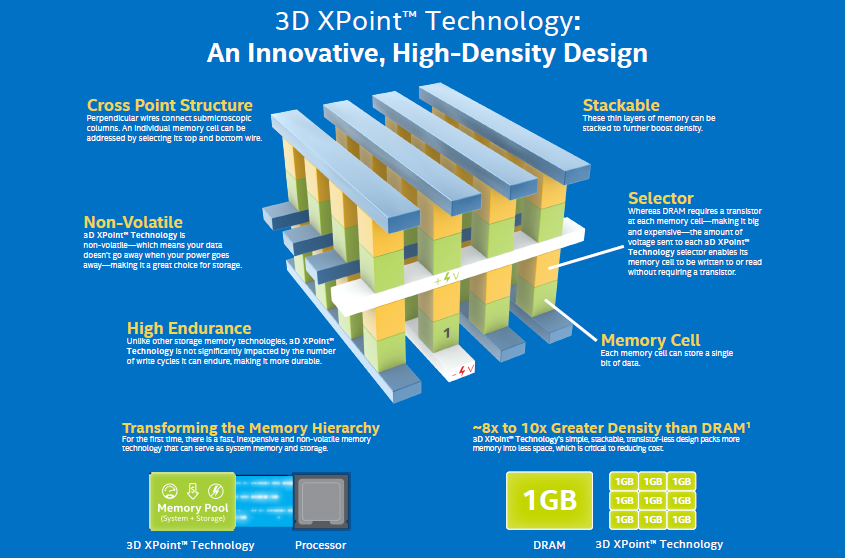http://www.cnet.com/news/intel-and-micr ... ng-drives/
CNET wrote:Intel and Micron today unveiled their all-new memory technology called 3D XPoint (pronounced "cross-point"). This is a new class of memory that can be used both as system memory as well as nonvolatile storage. In other words, 3D XPoint can be used to replace both a computer's RAM and its solid-state drive (SSD).
The companies claim that 3D XPoint is a major breakthrough in memory process technology, the first new memory category since the introduction of NAND flash in 1989. It's said to be extremely fast and durable, up to a thousand times faster (both in read and write speeds), and it will have higher endurance than existing NAND Flash memory currently being used in SSDs. What's more, it also has as much as 10 times greater density, leading to much more storage capacity in the same physical space, while remaining as energy efficient and affordable as existing NAND flash memory.
Mark Durcan, Micron's CEO, says the new technology is not to be confused with the 3D Flash memory used in Micron's latest SSDs, since 3D XPoint is a completely new class of memory.
According to Intel Vice President Rob Crooke, initially 3D XPoint will use PCI Express (PCIe) as its means of connecting to an existing computer, as PCIe currently has the the fastest bus speed of any peripheral interface. However, since PCIe is still not capable of handling the potential speed of 3D XPoint, in the future new ways will be developed to mount it, which will likely require entirely new motherboard architecture.
3d-xpoint-die.jpg
Enlarge Image
Dies for the 3D XPoint. Intel
Clearly, with its ultrahigh performance, 3D XPoint technology will enhance the PC experience tremendously, especially in gaming, as large amounts of data can be loaded into the memory more quickly. On top of that, any applications that require low-latency storage will also benefit from 3D XPoint.
Intel says 3D XPoint results from the company's years of research and development, overcoming many hurdles including the chance that it would not be successful. 3D XPoint stores data in a totally different manner from the means used by existing NAND. It uses the property change of the memory cell itself, instead of storing the cell in a capacitor in the traditional way.
In terms of technology, 3D Xpoint memory includes the following characteristics:
Cross-point array structure: Perpendicular conductors connect 128 billion densely packed memory cells. Each memory cell stores a single bit of data. This compact structure results in high performance as well as high-density bits.
Stackable: In addition to its tight cross-point array structure, memory cells are stacked in multiple layers. The initial technology stores 128Gb per die across two memory layers. Future generations of this technology may increase the number of memory layers, in addition to traditional lithographic pitch scaling, thus further improving system capacities.
Selector: Memory cells are accessed and written or read by varying the amount of voltage sent to each selector. This eliminates the need for transistors, increasing capacity while reducing cost.
Fast-switching cell: With its small cell size, fast-switching selector, low-latency cross-point array and fast-write algorithm, the cell is able to switch states faster than any existing nonvolatile memory technology.
3D XPoint technology is now in production and will be sampled later this year with select customers. Intel and Micron are developing individual products based on the technology that are forecast to be available sometime next year.
